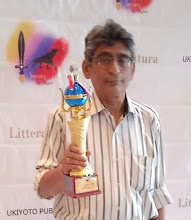As anticipated, the political masters of Pakistan have finally directed its national cricket team to lift the boycott and play India on 15 February, 2026, as scheduled in Colombo . The Masters must've thought the money at stake is too lucrative to continue indulging in such kind of grumpy politics. Of course, they had imposed some pre-conditions that included making the 'handshake' a mandatory protocol, but the ICC looked the other way. So, the PCB takes it as protecting the 'spirit of cricket'. The Indian cricket board , the sponsors, the TV channels and millions of fans who do not necessarily mix patriotism with sports, if it's cricket in particular, must be deliriously ecstatic that all the revenues and hype and excitement shall be there for harvest thr oughout the ICC Men's T20 World Cup-2026 , co-hosted by India and Sri Lanka . Most of the Indians fans must also be ecstatic to have their heroes go on vanquishing the enemy neighbor and humiliating t...
Today, the 10th of October, 2011, 8.10am—the end of a momentous musical era. Indian Ghazal king Jagjit Singh breathed his last at a Mumbai hospital following a brain hemorrhage he suffered on September 23. He had been put on life supporting system and though there were signs of improvements in between death prevailed finally.
Jagjit Singh had a strong, soulful, filling and soothing voice supported by powerful melody that lingered in the auditorium and on the spellbound listeners. Along with his singer wife Chitra Singh Jagjit Singh created his own Ghazal genre that almost matched the popularity of the film music genre. His forays into playback singing and music direction for several mainstream Hindi movies and television serials heightened his music’s mass appeal even further. The singer-composer couple also created history in Indian music by using the first ever digital multi-track recording for their CD Beyond Time (1987)—India
We did our school and college days getting to know his voice and his music. The Unforgettables (1975), the first Jagjit –Chitra Singh album to release in India
Jagjit Singh had a sense of pain and melancholy in his voice that got more acute after his only son died in a tragic road accident in Mumbai in 1990. Though he fell silent for six months after the tragedy, this melancholy enriched his voice further making it more touching and appealing. He had left behind a huge body of work behind in a career spanning five decades and 80 albums. His concerts had been regular in different parts of India
We deeply mourn this great loss to Indian music and the Ghazal genre.



His melodious voice remains forever in our hearts...
ReplyDelete